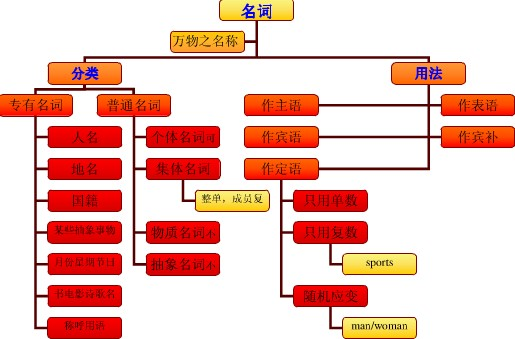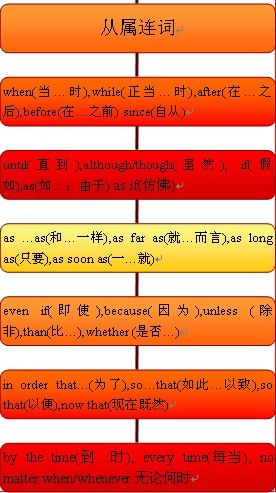本试题 “It made many countries angry ________ America, without the ________ from the UN, started awar in Iraq.[ ]A. that; permissionB. which; permitC. whic...” 主要考查您对名词
从属连词
等考点的理解。关于这些考点您可以点击下面的选项卡查看详细档案。
- 名词
- 从属连词
名词的概念:
名词(Nouns)是词性的一种,也是实词的一种,是指代人、物、事、时、地、情感、概念等实体或抽象事物的词。名词可以独立成句。在短语或句子中通常可以用代词来替代。名词可以分为专有名词(ProperNouns)和普通名词(CommonNouns),普通名词又可分为不可数名词和可数名词两大类。
名词的数:
1、名词复数的构成方法:
(1)在一般情况下,加词尾-s: book/books书 pen/pens钢笔 face/faces脸
(2)以s, x, z, sh, ch等结尾的名词,通常加词尾-es:bus/buses 公共汽车 box/boxes 盒子 dish/dishes 盘子
注:有些以ch结尾的名词,由于其发音不是[k]而是[tf],那么其复数形式应加词尾–s,如stomach/stomachs胃。
(3)以y结尾的名词,其复数构成要分两种情况:以“辅音字母+y”结尾的名词,将y改为ies;以“元音字母+y”结尾的名词,直接加词尾s:city/cities 城市 boy/boys 男孩 key/keys 钥匙
注:以y结尾的专有名词,若在某些特殊情况下需要复数,通常加s构成: Mary/Marys玛丽 Germany/Germanys德国
(4)以o结尾的名词,有些加词尾-s,有些加-es,有些加-s或-es均可: piano/pianos钢琴 tomato/tomatoes西红柿 zero/zero(e)s零
注:有人对英语中所有以o结尾的名词作了统计,一共近200个,其中绝大部分的复数形式通过加词尾-s构成,少数加词尾es。在中学英语范围内,加词尾es的主要有以下4个:
tomato西红柿,potato土豆,hero英雄,Negro黑人
(5)以f或fe结尾的名词,也有两种可能:即有些直接加词尾-s,有些则把f/fe改为ves: chief/chiefs首领 roof/roofs屋顶 knife/knives小刀
注:在中学英语范围内,要改f/fe为ves的只有以下10个词(它们都是日常生活中的常用词):
wife 妻子,life 生命,knife 小刀,leaf 树叶,thief 贼,half 一半,self 自己,shelf 架子,loaf 面包,wolf 狼。
另外,中学英语中的handkerchief(手帕)一词的复数有两种形式:handkerchiefs/handkerchieves,但在现代英语中,以用handkerchiefs为多见。
2、单数与复数同形式的名词:
中学英语中主要的有:sheep绵羊,fish鱼,deer鹿,Chinese中国人,Japanese日本人,Portuguese葡萄牙人,Swiss瑞士人,aircraft飞行器,means方法,series系列,head(牛等的)头数,works工厂,等。
注:fish有时也用fishes这样的复数形式,尤其表示种类时;
head若不是牲口的“头数”,而是表示“人的头”或“人数”,则要用heads这样的复数形式。
3、不规则的复数名词:
有的名词单数变复数时,没有一定的规则:
man/men男人 woman/women女人 child/children小孩 tooth/teeth牙齿 foot/feet脚 goose/geese鹅 mouse/mice老鼠 ox/oxen公牛
注:
(1)一些以man,woman结尾的合成词,在构成复数与man,woman的变化形式相同,如:
policeman/policemen警察,gentleman/gentlemen绅士,Englishman/Englishmen英国人,等等。但是human(人),German(德国人)不是合成词,其复数不能仿man的变化规律,而是按规则变化,即用humans,Germans。
(2)foot表示“英尺”时,其复数可以有两种形式feet/foot,如:
He is about six feet/foottall. 他大约6英尺高。
名词可数性的三个易错点:
(1)根据汉语习惯将英语的物质名词误认为是可数名词。如:
汉语中的“面包”,一般认为是可数的,可以说“一个面包”、“两个面包”等,但英语中的bread却通常是不可数的,不能相应地用a bread,two breads表示以上意思。不过有趣的是,loaf 表示“面包”却又是可数的,可说a loaf, two loaves。
(2)想当然地判断名词的可数性。如:
有的学生认为news (消息)和paper (纸)都不可数,于是便想当然地认为 newspaper (报纸)就一定不可数,但事实上,newspaper却是可数名词;又如:
有的同学认为 tear (眼泪)即“泪水”,并将其与water(水)相联系,认为tear 是不可数的,但事实上,tear却是可数的。
(3)受名词一词多义的影响。有的名词不止一个意思,且用于不同意思时,其可数性也有不同,不要形成思维思势。如:
aim表示“目的”时是可数名词,表示“瞄准”时是不可数名词;又如 experience表示“经验”时不可数,表示“经历”时则可数;再如:
fortune,当它表示“运气”时,不可数(=luck),当它表示“命运”时,可数,当它表示“财产”时,不可数,但可与a连用。
可数与不可数名词的常用修饰语:
(1)修饰可数名词的常用修饰语有:
these, those, few, a few, many, a good[great] many, agreat[good]number of 等。
注:a good[great]many后直接跟名词,没有介词of。
(2)修饰可数名词的常用修饰语有:
this, that, a few, a little, a bit of, much, no, a great deal of 等。
(3)有些修饰语既可修饰可数名词也可修饰不可数名词:
all, some, enough, a lot of, lots of, plenty of, a large amount of, a large quantity of等。
(4)有些名词形式上是复数,但却被用作不可数名词,使用much, little等修饰语:
He hasn't got much brains.他没什么头脑。
He took much pains to do the work. 他费了不少心做这工作。
I said I wouldn't want much wages. 我说过我不要很多工资。
It's high time you were taught a little manners.该是你学一点礼貌的时候了。
单位词与不可数名词数量表示法:
单位词是表示事物个体性的词语,不可数名词通常没有复数形式,也不可以用个数计算,要表示不可数名词的个体性需借助单位词:
a piece of paper一张纸
a piece of advice一条建议
a piece of news一条消息
an article of furniture一件家具
a cake of soap一块香皂
a slice of meat一块
a cup of tea一杯茶
a bottle of ink一瓶墨水
注:不要按汉语习惯在不该用单位词的地方错用单位词,如“一张邮票”只能说a stamp,而不能说a piece of stamp。
名词的可数性:
1、名词根据其可数性,可分为可数名词与不可数名词。一般说来,个体名词和大部分集合名词是可数的;而专有名词、物质名词、抽象名词以及少部分集合名词则通常是不可数的。但是这种区分只是大致的,原则性的,并不是绝对的。英语有些名词往往既是可数也可以是不可数的。
A:Would you like a cake? 要吃块蛋糕吗?
B:No, I don't like cake.不吃,我不喜欢吃蛋糕。
以上第一句用a cake,这是把cake视为一块一块的“蛋糕”,所以它是可数的;而第二句只用cake,这是把它当作物质名词看待,所以它成了不可数名词。
2、不同类别名词的可数性。
(1)专有名词的可数性。
在通常情况下,专有名词具有“独一无二”的含义,因此它通常没有复数形式,即不可数。但是,专有名词的独一无二性通常是相对的,随着范围的扩大,这种独一无二性便会受到破坏。
如在一个星期(week)内,只有一个星期六(Saturday),一个星期日(Sunday)等,但是在一个月中甚至一年中,便有多个星期六,多个星期日了。所以我们有时可以说:
We have spent many happy Sundays there. 我们在那儿度过了许多个愉快的星期日。
又如,在一个小范围内,可能只有一个Henry,但在一个较大的范围内则可能有多个Henry,因此我们有时会见到这样的句子:
There are five Henrys in our school. 我们学校有五个亨利。
另外,若专有名词转化成了普通名词,也可以是可数的:
Thousands of LeiFengs have emerged in China.中国涌现出了千千万万个雷锋。
(2)个体名词的可数性。
个体名词表示的是一个一个的人或物的个体,所以它通常是可数的。
(3)物质名词的可数性。
由于物质名词在通常情况下不能分为个体,所以它通常是不可数的。但是,在某些特殊情况下(如表示种类等),有些物质名词也可以连用不定冠词或用复数形式:
wine酒(不可数),a wine一种酒(可数), beer啤酒(不可数),two beers两杯啤酒(可数) ,glass玻璃(不可数),some glasses一些玻璃杯(可数)
(4)抽象名词的可数性。
抽象名词是表示事物性质、行为、状态、感情等抽象概念的,因此它通常是不可数的。但是,有时抽象名词也可转化为具体名词(可数),表示具有某种性质的人或事物:
success成功(不可数),asuccess成功的人或事(可数) ,pleasure愉快(不可数),apleasure令人愉快的人或事(可数)
(5)集合名词的可数性。集合名词表示若干个体组成的集合体,它本身通常是可数的,其复数形式表示多个集合体:
a family一个家庭,three families三个家庭 a team一个队,two teams两个队 a crowd一群人,crowds多群人
名词知识体系:

特殊名词的复数形式:
1、复合名词的复数形式。通常是将其主要名词变为复数:
passer-by/passers-by 过路人
shoe-maker/shoe-makers 鞋匠
looker-on/lookers-on 旁观者
on-looker/on-lookers 旁观者
father-in-law/fathers-in-law 岳父
若没有主要名词,则通常在最后一个词加s:
go-between/go-betweens中间人,
媒人 know-all/know-alls 万事通
注:由man/woman用于另一名词前构成的合成名词,两者均变为复数:
man doctor/men doctors男医生
woman writer/women writers 女作家
2、字母、文字、数字、符号等的复数形式。原则上加词尾-'s:
There are two i's in the word"skiing". skiing.这个词里有两个字母i。
如:Mind your p's and q's. 要谨言慎行。
All the–'s should be changed to+'s. 所有的正号应改为负号。
注:若不至于发生混淆,也可只加词尾s。
如:He was born in the 1930(')s. 他出生在20世纪30年代。
Your 3(')s look like 8(')s. 你写的3看起来像似8。
3、度量衡单位的缩写词的复数形式。
一般不加词尾-s:
m(meter, meters)米 km(kilometer, kilometers)千米 kg(kilogramme, kilogrammes)千克 cm(centimeter, centimeters)厘米;
有的缩写词也加s:
hr(hours)/hrs(hours)小时 No(number)/Nos(Numbers)号码;
有个别缩写词采用重复最后一个字母的方式构成复数形式:
p.10(page10)第10页 pp.10(pages10through15)第10至15页
从属连词的概念:
连词用于引导从句以形成句子的一部分或修饰句子的构成要素的叫作从属连词。
英语从属连词用法分类详解:
1、引导时间状语从句的从属连词:
(1)表示“当…时候”或“每当”的时间连词。主要的when, while, as, whenever:
如:He jumped up when the phone rang. 电话铃响时他吓了一跳。
We listened while the teacher read. 老师朗读时我们听着。
The phone rang just as I was leaving. 我正要离开,电话铃就响了起来。
(2)表示“在…之前(或之后)”的时间连词。主要的有before, after:
如:Turn the lights off before you leave. 离开前请关灯。
He started the job soon after he left the university. 他大学毕业后就开始做这份工作。
(3)表示“自从”或“直到”的时间连词。主要的有since, until, till:
如:He has lived here since he got married. 他结婚后就一直住在这儿。
Most men worked until[till] they're 65. 大多数男人工作到65岁。
(4)表示“一…就”的时间连词。主要的有as soon as, the moment, the minute, the second, the instant, immediately, directly, instantly, once, no sooner…than, hardly…when等:
如:Tell him the news as soon as you see him. 你一见到他就把这消息告诉他。
I recognized her the moment(that) I saw her. 我一看到她就认出她来了。
I want to see him the minute(that) he arrives. 他一到来我就要见他。
I went home directly I had finished work. 我一干完活就回家了。
Once he arrives, we can start. 他一来我们就可以开始。
(5)表示“上次”、“下次”、“每次”等的时间连词。主要的有every time(每次),each time(每次),(the) next time(下次),any time(随时),(the) last time(上次),the first time(第一次):
如:Last time I saw him, he looked ill. 上次我见到他的时候,他好像有病。
Next time you're in London come and visit us. 你下次来伦敦过来探望我们。
Do look me up next time you're in London. 你下次到伦敦来,一定来找我。
Every time I call on him, he is out. 我每次去访问他,他都不在。
You can call me any time you want to. 你随时都可以给我打电话。
【注】every time,each time,any time前不用冠词,(the)next time, (the)last time中的冠词可以省略,而the first time中的冠词通常不能省略。
2、引导条件状语从句的从属连词:
这类连词主要有if, unless, as[so] long as, incase等:
如:If anyone calls tell them I'm not at home. 要是有人打电话来,就说我不在家。
You will fail unless you work hard. 你若不努力就会失败。
As[So] long as you need me, I'll stay. 只要你需要我,我就留下。
In case I forget, please remind me about it. 万一我忘记,请提醒我一下。
【注】在条件状语从句中,通常要用一般现在时表示将来意义,而不能直接使用将来时态。不过,有时表示条件的if之后可能用will,但那不是将来时态,而是表示意愿或委婉的请求(will为情态动词):
如:If you will wait a moment, I'll fetch the money. 请等一下,我就去拿钱。
3、引导目的状语从句的从属连词:
主要有in order that, so that, in case, for fear等:
如:We used the computer in order that we might save time. 我们使用计算机是为了节约时间。
Speak clearly so that they may understand you. 说清楚,以便让他们能明白你的意思。
Be quiet in case you should wake the baby. 安静些,免得把婴儿吵醒。
He is working hard for fear he should fail. 他努力工作以免会失败。
4、引导结果状语从句的从属连词:
主要的有so that, so…that, such…that等:
如:We're all here now, so that the meeting can begin at last. 我们现在都到齐了,终于能开会了。
It's so difficult a question that none of us can answer it. 那是一个很难的问题,我们没有一个人能回答。
He shut the window with such force that the glass broke. 他关窗户用力很大,结果玻璃震破了。
【注】so that中的that在口语中通常可以省略。
5、引导原因状语从句的从属连词:
主要的有because, as, since, seeing(that), now(that), considering(that)等:
如:He couldn't got to school because he had a cold. 他因患感冒而未能去上学。
Since everybody is here, let's begin our discussion. 大家都到了,我们就开始吧。
Seeing that it is 8o'clock, we'll wait no longer. 由于时间已到8点,我们将不再等了。
Now that you are here, you'd better stay. 你既然来了,最好还是留下吧。
6、引导让步状语从句的从属连词:
主要有although, though, eventhough, even if, while, however, whatever, whoever, whenever, wherever等:
如:Although[Though] he is poor, he is well contented. 他虽穷却能知足常乐。
Though[Even though] it's hard work, I enjoy it. 尽管是苦活,但我乐意干。
Even if you don't like wine, try a glass of this. 即使你不喜欢喝酒,也尝尝这杯吧。
7、引导方式状语从句的从属连词:
主要有as, like, as if, as though, the way等:
如:Do it as[like] he does. 像他那样做。
He behaved as if nothing had happened. 他装作若无其事的样子。
They treat me as though I were a stranger. 他们待我如陌生人。
Nobody else loves you the way(=as) I do.没有人像我这样爱你。
8、引导地点状语从句的从属连词:
主要有where, wherever, everywhere等:
如:There were lots of parks where I lived. 我住的地方有许多公园。
Sit wherever you like. 你想坐在那儿就坐在那儿。
Everywhere they went, they were warmly welcomed. 他们每到一个地方都受到热烈欢迎。
9、引导比较状语从句的从属连词:
主要有than和as…as:
如:It's easier than I thought. 这比我想像的要容易。
They are as often wrong as they are right. 他们错对各半。
10、引导名词性从句的从属连词:
主要有that, if, whether:
如:It is clear enough what he meant. 他是什么意思很清楚。
Your greatest fault is that you are careless. 你最大的缺点是粗心大意。
Whether it will do us harm remains to be seen.是否对我们有害还要看一看。
She didn't say if he was still alive. 她没说他是否还活着。
从属连词知识体系:

用作从属连词的六类名词结构:
英语中有些名词结构可用作从属连词,用以引导状语从句,且主要是时间状语从句。这类结构归纳起来有以下六类:
一、the+瞬间名词:
其中的瞬间名词主要包括moment, minute, instant, second等,其意为“一……就……”,相当于as soon as。
如:The minute he saw her he fell in love. 他对她一见倾心。
Telephone me the moment(that) you get the results. 你一有结果,马上给我打电话。
I was so tired that I fell asleep the instant I closed my eyes. 我很累,一合上眼就睡着了。
Sheputdownthereceiverthesecondsherecognizedmyvoice.她一听出是我的声音,马上就放下电话听筒。
注:其中的瞬间名词后可接that,也可省略。另外,有的个别副词(如directly/immediately等)也可表示类似意思。
如: Immediately the meal was over,he switchedon the radio.饭一吃完他就把收音机打开。
二、the+季节名词:
其中的季节名词包括spring,summer,autumn,winter,其意为“在……的那年春天、夏天、秋天、冬天。
如:His wife left him thes pring he went abroad.在他出国的那年春天,他的妻子离开了他。
He sold his house and went to the souththe summer he lost hisjob.在他失业的那年夏天,他卖掉房子去了南方。
He was sentto prison the winter his third daughter was born.在他第三个女儿出生的那年冬天,他被关进了监狱。
She got married the autumn she graduated from college.她大学毕业的那年秋天就结婚了。
三、the+时间名词:
其中的时间名词主要包括hour,day,night,week,month,season,year等,其意为“在……的时候、那天、那个晚上、那周、那个月、那个季节、那年”。
如: The hour he wa sin her office,he felt very sad.当他在她办公室的时候,他感到很伤心。
The day here turned home,his father was already dead.他回家的那一天,他的父亲已经死了。
The night I wenttoseeher,shehadleftforBeijingtoattendanimportantmeeting.就我去看她的那个晚上,她到北京去开一个重要的会议了。
Mr Smith didn't go to work the week his wife was ill.史密斯先生在他妻子生病的那个星期没去上班。
They ear helivedinthecountry,he learned alot.他在乡下呆的那一年,他学到了不少东西。
四、the+序数词+time
其中的序数词包括first,second,third,fourth等,其意为“当第几次……的时候”。
如: My girlfriend beat me at pokert he first time weplayed.我头一次和女朋友打扑克,她就把我赢了。
These cond time I saw her,she looked like an old woman.我第二次见到她时,她看上去像一个老太婆。
The third time I went there,I found all of them had left and the offices were all empty.我第三次去那儿时,我发现他们都离开了,所有的办公室都是空的。
注:
1.next,last也具有类似序数词的性质,因此也具有以上用法。
如: Nexttimeyoucomein,pleaseclosethedoor.下次你进来,请关门。
Thelasttimewetalkedhesaidheneededanothertwodays.上次我们谈话时他说他还需要两天。
2.thefirsttime,thesecondtime,thethirdtime等用作连词引导时间状语从句时,其前通常要有定冠词,而(the)nexttime,(the)lasttime引导状语从句时,其中的冠词可以省略,如下面这道上海高考题,其答案是C,不是A:
I though ther nice and honest______Imether.
A.first time B.fo rthe first time C.the first timeD.by the first time
五、不定代词+time
其中的不定代词主要包括each,every,any等。
如:Every time I ringher,the phone is engaged.我每次给她打电话,电话都占线。
Every time I see him he either wants to tell me his trouble or borrow some money.每次我见到他,他不是向我诉苦,就是要向我借钱。
He felt nervous each times he spoke to him.每次她和他讲话,他都感到紧张。
AnytimeyoucometoLondondolookmeup.你无论什么时候到伦敦来,一定要来看我。
注意:everytime,eachtime,anytime用作连词引导状语从句时其前习惯上不用冠词,它与the first time,these cond time,the third time等引导时间状语从句时其前必须要用定冠词不同。
六、其他名词结构
以上归纳的名词结构均用于引导时间状语从句,有些其他结构还可引导其他性质的状语从句,如the way可用于引导方式状语从句,表示“像……一样”。如:
The didn’t do it the way we do now.那时他们不像我们现在这样行事。
Joyce looked at me the way alotof girls did.乔伊丝像许多姑娘那样瞧着我。
注:这样用的theway与as用法相似。
如:Hold itin both hands,the way(=as)Mummy does.用两只手捧住,像妈妈那样。
与“It made many countries angry ________ America, without th...”考查相似的试题有:
- People should open the window in the morning to make air ________ in order to keep the indoorair fresh.[ ]A. spreadB....
- On your way to New York William will keep you ______if you don't want to be lonely.A.companyB.companionC.safetyD....
- When a discussion is under way, everyone is welcome to have the_________ in class.A floor B time C chance D right
- 短文改错。此题要求改正所给短文中的错误,对标有题号的每一行做出判断:如有错误(每行只有一个错误),则按下列情况改正:...
- The reason for our failure was the _____ of enough time and money.[ ]A. lackB. limitC. useD. demand
- He made a(n)__________ with his wife "You take care of the children and I'll cook."[ ]A. bargainB. apologyC. promiseD...
- That’s all for the introduction to your arrangements these days. So now ______ there are any questions, I’d like to g...
- She had just finished her homework ____ her mother asked her to practice playing the piano yesterday.A.whenB.whileC...
- ________see the children before they went to bed, he came home earlyA.So as toB.In order toC.So thatD.In order that
- Not ________ I stepped into Grade two did I choose to study arts.A.untilB.whenC.asD.after